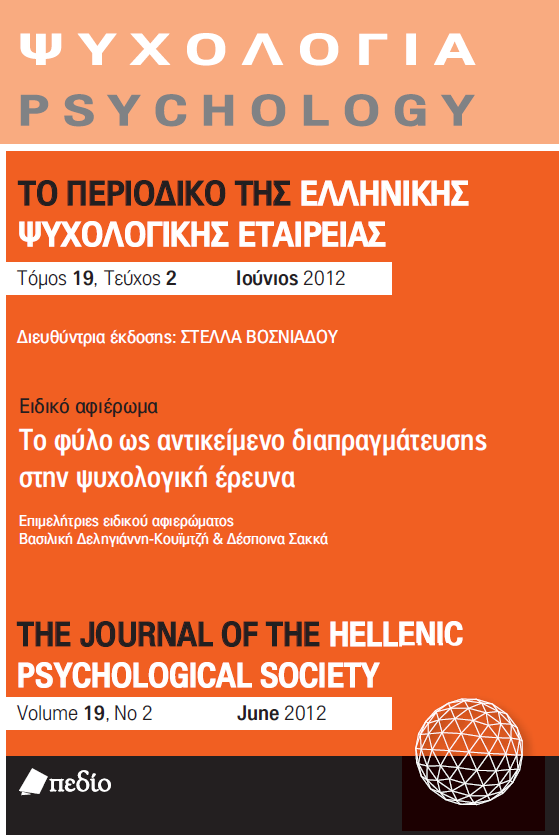Ανατρέποντας τη θεώρηση των παιδιών στην ανάπτυξη: Μια πρόταση της αντιαναπτυξιακής ψυχολογίας από το βρετανικό Βορρά

Περίληψη
Στην εργασία αυτή σκιαγραφείται μια φεμινιστική αντιψυχολογική προσέγγιση ανάλυσης εκδοχών της παιδικής ηλικίας. Με σημείο εκκίνησης το χαρακτηρισμό του φεμινισμού ως αντιψυχολογίας από την Squire (1990), η εργασία αναλύει την ανάπτυξη του παιδιού ως κείμενο. Παρατίθενται παραδείγματα από ένα εύρος θεσμικών πρακτικών και
ειδών, με στόχο να αναδειχθούν κάποιες ανατροπές των σύγχρονων τρόπων έκφρασης της φυσιολογικοποιημένης παιδικής ηλικίας, που αναδύθηκαν πρόσφατα στο βρετανικό Βορρά. Δεν προκαλεί, ενδεχομένως, έκπληξη το γεγονός ότι οι πρόσφατες αποκλίσεις από το ορθολογικό, αυτόνομο, ενιαίο υποκείμενο της μοντέρνας αναπτυξιακής ψυχολογίας (βλ. Henriques et al, 1984. Burman 1994, 2008a) προδίδουν πολιτικές συνέχειες με παλαιότερες διατυπώσεις (ειδικά σε σχέση με τον οικογενειοκεντρισμό. Παρότι η εποχή μας έχει χαρακτηριστεί συχνά ως ευέλικτη, θα υποστηριχθεί ότι οι λανθάνουσες συνέχειες που διέπουν τις εμφανείς αλλαγές –κυρίως όσον αφορά τη διαμόρφωση έμφυλων και φυλετικά χρωματισμένων αναπαραστάσεων– αναδεικνύουν κάποια θεμελιώδη παγιωμένα στοιχεία, μολονότι τους αποδίδεται τώρα μια «δημοκρατική» χροιά. Υποστηρίζεται ότι μέσω της εξάπλωσής τους αλλά και της μεταξύ τους αντιπαράθεσης αυτά τα ποικίλα κείμενα μπορούν να τεθούν στην υπηρεσία μιας κριτικής αφήγησης. Αυτή η πολιτική-μεθοδολογική παρέμβαση λειτουργεί, πρώτον, ώστε να αποδομήσει την αντίθεση ανάμεσα στη δημοφιλή πολιτισμικά γνώση και στην ειδική γνώση (της αναπτυξιακής ψυχολογίας) και να καταδείξει την αμοιβαία υποστήριξη και νομιμοποίησή τους. Δεύτερον, μέσω αυτού του δείγματος διαθέσιμων αναπαραστάσεων της παιδικής ηλικίας αναδεικνύεται μια θεμελιώδης στρατηγική (όπως περιέγραψε και η Richards, 1998) τοποθέτησης της ψυχολογίας στην περιορισμένη (πολιτισμικά και ιστορικά) θέση της. Η εργασία τελειώνει με κάποιες γενικότερες επιστημολογικές και δεοντολογικές σκέψεις, που αφορούν τις συμμαχίες και τους ανταγωνισμούς ανάμεσα σε διεπιστημονικές προσεγγίσεις της παιδικής ηλικίας, και τη συμβολή τους στην αμφισβήτηση ευρύτερων αναπτυξιακών συστημάτων λόγου.
Λεπτομέρειες άρθρου
- Πώς να δημιουργήσετε Αναφορές
-
Burman, E. (2020). Ανατρέποντας τη θεώρηση των παιδιών στην ανάπτυξη: Μια πρόταση της αντιαναπτυξιακής ψυχολογίας από το βρετανικό Βορρά. Ψυχολογία: το περιοδικό της Ελληνικής Ψυχολογικής Εταιρείας, 19(2), 125–143. https://doi.org/10.12681/psy_hps.23612
- Τεύχος
- Τόμ. 19 Αρ. 2 (2012)
- Ενότητα
- ΕΙΔΙΚΟ ΑΦΙΕΡΩΜΑ

Αυτή η εργασία είναι αδειοδοτημένη υπό το Creative Commons Attribution-ShareAlike 4.0 International License.
Το περιοδικό ΨΥΧΟΛΟΓΙΑ έχει υιοθετήσει μία πολιτική Platinum open-access. Τα έξοδα υποβολής, επεξεργασίας ή δημοσίευσης των εργασιών καλύπτονται από την Ελληνική Ψυχολογική Εταιρεία. Τα πνευματικά δικαιώματα των δημοσιευμένων εργασιών προστατεύονται από την άδεια 'Creative Commons Attribution-ShareAlike 4.0 International'. Οι Συγγραφείς διατηρούν τα Πνευματικά Δικαιώματα και χορηγούν στο περιοδικό το δικαίωμα της πρώτης δημοσίευσης. Η άδεια αυτή επιτρέπει σε τρίτους, να χρησιμοποιούν την εργασία σε οποιαδήποτε μορφή, με την προϋπόθεση της διατήρησης των διατυπώσεων που προβλέπονται στην άδεια σχετικά με την αναφορά στον αρχικό δημιουργό και την αρχική δημοσίευση στο περιοδικό ΨΥΧΟΛΟΓΙΑ. Επιπλέον, κάθε διανομή της εργασίας οφείλει να γίνεται με τους ίδιους όρους διανομής, δηλαδή με την ίδια άδεια Creative Commons.


